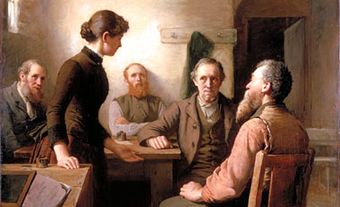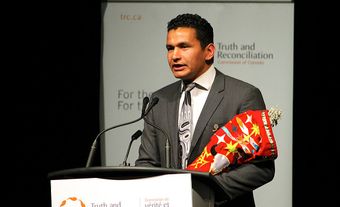Wilson, Sir Daniel
Sir Daniel Wilson, scientist, author, educator (b at Edinburgh, Scot 5 Jan 1816; d at Toronto 6 Aug 1892). Wilson was a man of many talents. He was educated at Edinburgh U, studied art briefly with William Turner, wrote essays for Chambers' Journal, published a history of Oliver Cromwell, and was fascinated with antiquity during his Scottish years. In 1847, while secretary of the Scottish Antiquarian Soc, he published Memorials of Edinburgh in the Olden Time (illustrated by the author); 4 years later appeared The Archaeology and Prehistoric Annals of Scotland, in which was coined the word "prehistory."
In 1853 Wilson was appointed professor of history and English at the yet-to-be-constructed UNIVERSITY COLLEGE in U of T. He contributed to the design of the building, was a major defender of the "provincial university" against denominational attack and became president of University College (nondenominational) in 1880. During these years Wilson continued his scientific research, especially in the emerging field of ethnology. He became a major interpreter in Canada of the scientific consequences of the work of Charles Darwin. While he accepted the extension of geological time and the evolution of species, Wilson rejected - as did his colleague J.W. DAWSON at McGill - the notion of natural selection as unproven speculation, and insisted upon innate differences between man and animal, largely on religious grounds. Wilson's 2-vol Prehistoric Man: Researches into the Origin of Civilisation in the Old and New World (1862), a masterpiece of 19th-century ethnology and erudition, was meant to disprove natural selection. One of the best-known scholars in Canada, Wilson was president of the ROYAL SOCIETY OF CANADA (which he helped found in 1882) in 1885.
Much of Wilson's energy was taken up with university administration. In the 1880s he sought to preserve the best interests of U of T and University College in the face of a movement to federate denominational colleges with the provincial university. He opposed the notion, but accepted political and economic realities, and became the first president of U of T under the Federation Act of 1887. His last years were plagued by bitter animosities and professorial bickering within the university community.

 Share on Facebook
Share on Facebook Share on X
Share on X Share by Email
Share by Email Share on Google Classroom
Share on Google Classroom


